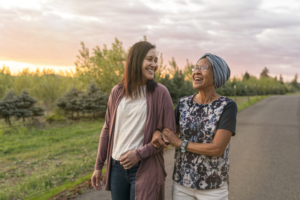The Key to a Joyful Life for Older Adults May Surprise You

Close relationships and contentment are the keys to creating a joyful life for older adults.
It has taken nearly 80 years and a slew of scientific studies to come up with the result: a good genetic makeup and wealth really have little to do with our amount of joy. The Harvard Study of Adult Development launched in 1938, delving into the lives of high-profile participants such as Ben Bradlee and John F. Kennedy. Over the years, it is been expanded to add inner-city residents as well as offspring from the original Harvard elite, and the results were unexpected, to say the least. So, what are the keys to a joyful life for older adults?
It was established that the very best predictors of a happy and long life were not IQ, genetics, fame, finances, or social class but simply close relationships. Robert Waldinger, director of the research, a psychiatrist at Massachusetts General Hospital, and a professor of psychiatry at Harvard Medical School, shares, “The people who were the most satisfied in their relationships at age 50 were the healthiest at age 80. Loneliness kills. It’s as powerful as smoking or alcoholism.”
Psychiatrist George Vaillant, who led the research study between 1972 – 2004, shared in his book Aging Well: Surprising Guideposts to a Happier Life from the Landmark Harvard Study of Adult Development, the contributing factors that forecast healthy aging:
- The absence of smoking and alcohol abuse
- Physical activity
- Mature strategies to manage challenges in life
- Sustaining a healthy weight
- Having a stable marriage
The bottom line is, self-care is crucial to our level of joy – from the perspective of both physical and mental health. Devoting time and effort to making your relationships the very best they can be most certainly falls under that umbrella as well. In fact, subsequent scientific studies have revealed that the level of contentment men and women experience in their relationships is a much more accurate determinant of what their physical health is likely to be later in life than physical factors like cholesterol levels.
The research study also upended earlier thinking that our personalities are carved in stone by age 30. Many who encountered difficulties in their early adult years enjoyed happier later years, while others excelled early in life but ran into challenges in later years due to mental health issues and alcoholism.
The study is ongoing, looking into its third and fourth generations, as researchers believe there is still more to understand, such as just how to more effectively manage stress and whether a hard childhood can impact middle age and later years.
Let Responsive Home Care’s knowledgeable caregivers help instill joy in a senior’s life; contact us today! Our caregivers serve as warm and friendly companions to take part in exercise, conversations, and enjoyable activities together, fostering socialization and additional relational connections. You can reach us any time at 954-486-6440 to schedule a free in-home assessment to find out more information about our home care assistance in Plantation, FL and neighboring areas.

